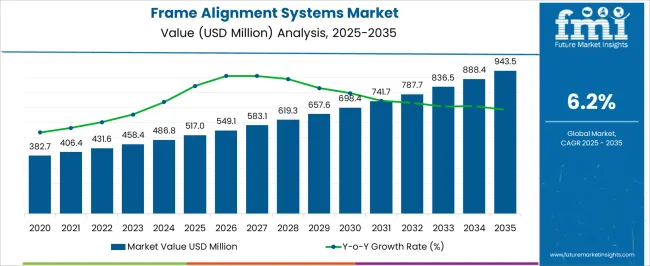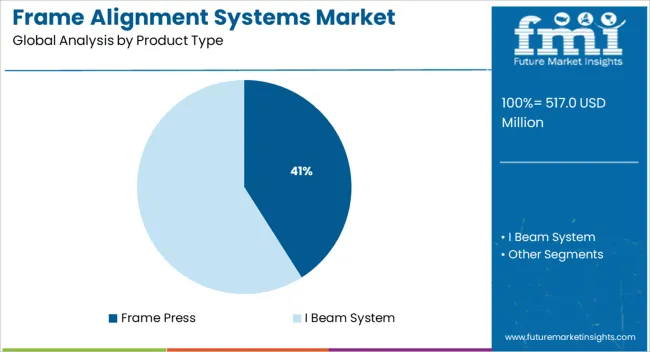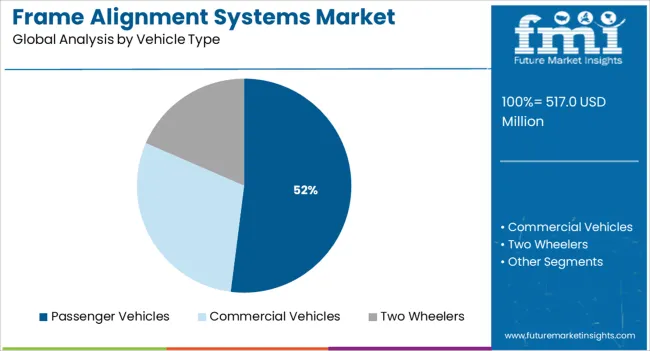The Frame Alignment Systems Market is estimated to be valued at USD 517.0 million in 2025 and is projected to reach USD 943.5 million by 2035, registering a compound annual growth rate (CAGR) of 6.2% over the forecast period.

| Metric | Value |
|---|---|
| Frame Alignment Systems Market Estimated Value in (2025 E) | USD 517.0 million |
| Frame Alignment Systems Market Forecast Value in (2035 F) | USD 943.5 million |
| Forecast CAGR (2025 to 2035) | 6.2% |
The frame alignment systems market is witnessing consistent growth driven by increasing demand for vehicle safety, precision repair, and efficiency in automotive workshops. The rise in vehicle ownership, coupled with stricter safety regulations and rising awareness about vehicle maintenance, has elevated the need for advanced alignment solutions.
Innovations in technology are enabling more accurate diagnostics and faster service times, which are essential for both repair shops and manufacturing units. As the automotive industry evolves towards electric and autonomous vehicles, frame alignment systems are becoming critical in maintaining structural integrity and performance.
Additionally, investments by key industry players in research and development to enhance system capabilities and user interfaces are expanding the applicability of these solutions. Growing urbanization and expanding road networks globally continue to increase the volume of vehicles requiring alignment services, further supporting market expansion and providing a favorable outlook for future growth.
The market is segmented by Product Type and Vehicle Type and region. By Product Type, the market is divided into Frame Press and I Beam System. In terms of Vehicle Type, the market is classified into Passenger Vehicles, Commercial Vehicles, and Two Wheelers. Regionally, the market is classified into North America, Latin America, Western Europe, Eastern Europe, Balkan & Baltic Countries, Russia & Belarus, Central Asia, East Asia, South Asia & Pacific, and the Middle East & Africa.

When segmented by product type, frame press holds 41.0% of the total market revenue in 2025, positioning it as the leading product category. This prominence is attributed to its essential role in straightening vehicle frames efficiently and accurately, which is critical for collision repair and structural maintenance.
The frame press’s ability to handle diverse vehicle damage scenarios with precision has driven its adoption among automotive repair centers. Enhanced automation and integration with diagnostic tools have further increased its operational efficiency, reducing repair time and labor costs.
Moreover, the robustness and versatility of frame press systems enable workshops to service a wide range of vehicle sizes and types, enhancing their utility and value proposition. These factors collectively have propelled the frame press segment to a dominant position within the market.

Segmented by vehicle type, passenger vehicles account for 52.0% of the market revenue in 2025, establishing this segment as the foremost contributor. The leading position is largely driven by the high volume of passenger vehicles on roads globally and the corresponding demand for maintenance and repair services.
Increasing consumer focus on vehicle safety and longevity has raised the frequency of alignment and frame repair activities in this segment. The diversity of passenger vehicles, from compact cars to SUVs, necessitates flexible and precise frame alignment solutions, which has accelerated technology adoption.
Additionally, the growth of ride-sharing and fleet management services has contributed to heightened maintenance standards, further stimulating demand. These dynamics have reinforced the passenger vehicles segment’s significant share in the frame alignment systems market.
The analysis of Frame Alignment Systems demand from 2020 to 2025 showed a historical growth rate of 0.60% CAGR. The key driver propelling the growth of the Frame Alignment Systems market throughout the historic period was the strong demand for correcting and aligning the chassis of a vehicle that is due for servicing. Also, demand for premium and luxury vehicles, including Passenger vehicles, SUVs, and electrical vehicles on a global scale fueled the market growth.
The frame alignment system production facility and automotive manufacturing sectors were both severely damaged by the coronavirus epidemic due to the COVID crisis's impact on the world economy. Due to the severe lack of raw materials needed to produce vehicles and their components, the industry which produced automobiles had been shut down. A disruption in the supply chain network has also severely restricted the market. However, at the beginning of 2025, with a declining trend in virus infection, rising support for green mobility, and growing concerns about vehicle safety, the market for frame alignment systems is anticipated to rise steadily over the projected period.
Rising safety concerns for vehicles and vehicle production are predicted to boost the growth of the global market for frame alignment systems. Additionally, growing economic development, improved consumer living standards, and increased purchasing power have all contributed to an increase in demand for luxury cars, large vehicles, and passenger cars, which is eventually fueling the expansion of the frame alignment systems market.
The rising worldwide number of vehicles is one of the major drivers boosting the automotive frame alignment system market. Vehicle life expectancy has recently surpassed 12 years on average. This increased lifespan is due to the exceptional durability of modern cars. Modern cars are built more rigidly, have an everlasting, and highly robust engine, and go through regular maintenance. Vehicle lifespans are growing as a result of this. As a result, there is an increase in demand for vehicle repair and maintenance services worldwide. Additionally, two-wheelers, sport bikes, trucks, commercial vehicles, and sports-utility vehicles (SUVs), as well as multipurpose vehicles (MPVs), are popular within the worldwide automotive market. To function properly, these vehicles require regular maintenance. Additionally, the customer uses these vehicles for longer periods, which increases the need for preventive maintenance services on crucial automotive parts like wheels, tires, and suspension. This factor fuels the global market of the frame alignment system.
Millions of people die in road accidents each year on a global scale, and the majority of them suffer severe injuries or disabilities. Due to this, government officials and automakers are now obligated to adhere to stringent guidelines and norms for the manufacturing of safe vehicles.
By industry safety regulations, manufacturers are mandated to check the alignment of newly manufactured vehicles. This is done by a frame alignment system, in which a frame alignment machine is used to straighten the frame.
The suspension and mechanical parts are properly aligned. The car will be much safer to drive once this structural modification by frame alignment system has been made. Thus, government norms for the automotive industry for safe vehicle production will produce a growth opportunity for the frame alignment system market.
The growing adoption of e-bikes on a global scale is also driving the frame alignment system market. Similarly, developing countries are getting more industrialized and urbanized, and industries like e-commerce, trade, and the food industry are also expanding.
These industries require both heavy and light commercial trucks as a transportation solution on a large scale, which will increase vehicle sales and lead to the expansion of the targeted market.
Geographically, in terms of frame alignment system sales, amongst all regions which are sub-segmented in the global market, North America and East Asia are the top regions and collectively account for a sizable portion of the global Fire Pump market in 2024.
The markets of frame alignment systems in the Asia Pacific are also exceptionally profitable for frame alignment system manufacturers. This is mainly because of China, India, and Japan's sizable automotive industries. Analysis shows that 60% of the world's population resides in the Asia-Pacific region. When taking into account population size, countries like China and India are the ones in the region with the fastest increasing populations. As this growing population necessitates efficient mobility, thus automotive industry in the region also increases. A high level of production and sales of passenger cars, light commercial vehicles, and heavy commercial vehicles are being generated in this region by some of the most well-known auto manufacturing companies in the world. This factor increases the prominent sales of frame alignment systems in the region.
Similarly, the market for frame alignment systems in North America has grown to be the greatest revenue contributor after the Asia Pacific. In this region, the market revenue is growing as a result of the rising demand for a sport bike, luxurious passenger cars, SUVs, and commercial vehicles for businesses. Additionally, the development and adoption of E-bikes and vehicles in the region are also fueling the demand for frame alignment, which is driving the frame alignment system market in the region. Additionally, the United States ranks among the countries with the greatest rate of fatal traffic accidents per million population. The vehicles involved in these incidents are then going through a frame alignment system to align the frame and chassis of vehicles. Also, To Create safe vehicles government authorities has forced to adhere to strict laws and regulations in the automotive industry. This will be benefitted the growth of the targeted market.
Key players operating in the Global Frame Alignment Systems Market include Josam Products Inc., Bee Line, Henry James Bicycles, Booth Concepts Inc., Blackhawk, Pro Line Systems International Inc., Chassis alignment Ltd., Scheibner Messentik, Chief Automotive Technologies, etc.
The Market for Frame Alignment Systems is Moderately Fragmented on a Global Scale. The leading corporations hold greater than 30% to 50% of the market share. The market for Frame Alignment Systems is expected to grow as a result of companies collaborating and acquiring competitors to expand their corporate operations and foreign direct investment.
| Attribute | Details |
|---|---|
| Growth Rate | CAGR of 6.20% from 2025 to 2035 |
| Base Year for Estimation | 2025 |
| Historical Data | 2020 to 2025 |
| Forecast Period | 2025 to 2035 |
| Quantitative Units | Revenue in USD Million, Volume in Units, and CAGR from 2025 to 2035 |
| Report Coverage | Revenue Forecast, Volume Forecast, Company Ranking, Competitive Landscape, Growth Factors, Trends, and Pricing Analysis |
| Segments Covered | Product Type, Vehicle Type, Region |
| Regions Covered | North America; Latin America; Europe; East Asia; South Asia Pacific; The Middle East and Africa(MEA) |
| Key Countries Covered | The USA, Canada, Mexico, Brazil, Germany, The UK, France, BENELUX, Italy, Spain, Russia,China, Japan, India, Turkey, South Africa, Northern Africa, GCC Countries, Australia |
| Key Companies Profiled | Josam Products Inc.; Bee Line; Henry James Bicycles; Booth Concepts Inc.; Blackhawk; Pro Line Systems International Inc.; Chassis alignment Ltd.; Scheibner Messentik; Chief Automotive Technologies |
| Customization Pricing | Available upon Request |
The global frame alignment systems market is estimated to be valued at USD 517.0 million in 2025.
The market size for the frame alignment systems market is projected to reach USD 943.5 million by 2035.
The frame alignment systems market is expected to grow at a 6.2% CAGR between 2025 and 2035.
The key product types in frame alignment systems market are frame press and i beam system.
In terms of vehicle type, passenger vehicles segment to command 52.0% share in the frame alignment systems market in 2025.






Our Research Products

The "Full Research Suite" delivers actionable market intel, deep dives on markets or technologies, so clients act faster, cut risk, and unlock growth.

The Leaderboard benchmarks and ranks top vendors, classifying them as Established Leaders, Leading Challengers, or Disruptors & Challengers.

Locates where complements amplify value and substitutes erode it, forecasting net impact by horizon

We deliver granular, decision-grade intel: market sizing, 5-year forecasts, pricing, adoption, usage, revenue, and operational KPIs—plus competitor tracking, regulation, and value chains—across 60 countries broadly.

Spot the shifts before they hit your P&L. We track inflection points, adoption curves, pricing moves, and ecosystem plays to show where demand is heading, why it is changing, and what to do next across high-growth markets and disruptive tech

Real-time reads of user behavior. We track shifting priorities, perceptions of today’s and next-gen services, and provider experience, then pace how fast tech moves from trial to adoption, blending buyer, consumer, and channel inputs with social signals (#WhySwitch, #UX).

Partner with our analyst team to build a custom report designed around your business priorities. From analysing market trends to assessing competitors or crafting bespoke datasets, we tailor insights to your needs.
Supplier Intelligence
Discovery & Profiling
Capacity & Footprint
Performance & Risk
Compliance & Governance
Commercial Readiness
Who Supplies Whom
Scorecards & Shortlists
Playbooks & Docs
Category Intelligence
Definition & Scope
Demand & Use Cases
Cost Drivers
Market Structure
Supply Chain Map
Trade & Policy
Operating Norms
Deliverables
Buyer Intelligence
Account Basics
Spend & Scope
Procurement Model
Vendor Requirements
Terms & Policies
Entry Strategy
Pain Points & Triggers
Outputs
Pricing Analysis
Benchmarks
Trends
Should-Cost
Indexation
Landed Cost
Commercial Terms
Deliverables
Brand Analysis
Positioning & Value Prop
Share & Presence
Customer Evidence
Go-to-Market
Digital & Reputation
Compliance & Trust
KPIs & Gaps
Outputs
Full Research Suite comprises of:
Market outlook & trends analysis
Interviews & case studies
Strategic recommendations
Vendor profiles & capabilities analysis
5-year forecasts
8 regions and 60+ country-level data splits
Market segment data splits
12 months of continuous data updates
DELIVERED AS:
PDF EXCEL ONLINE
Frameless Structural Glass Balustrade Market Size and Share Forecast Outlook 2025 to 2035
Frame Cutting Jib Miner Market Size and Share Forecast Outlook 2025 to 2035
Mainframe Security Market
Half-frame Oblique Cameras Market Size and Share Forecast Outlook 2025 to 2035
Full-frame Oblique Cameras Market Size and Share Forecast Outlook 2025 to 2035
Space Frame Market Size and Share Forecast Outlook 2025 to 2035
Rubber Frame Monitors Market Size and Share Forecast Outlook 2025 to 2035
Bicycle Frames Market Analysis - Size, Share, and Forecast Outlook 2025 to 2035
Aluminum Frame Monitors Market Size and Share Forecast Outlook 2025 to 2035
Plate and Frame Heat Exchanger Market Size and Share Forecast Outlook 2025 to 2035
Back Mount Frames Market Size and Share Forecast Outlook 2025 to 2035
Rail Brake Frame Market
Aircraft Seat Frames Market
Aircraft Window Frame Market Size and Share Forecast Outlook 2025 to 2035
Automotive Seat Frame Market
Nitinol Heart Valve Frames Market Analysis Size and Share Forecast Outlook 2025 to 2035
Solar Aluminum Alloy Frame Market Size and Share Forecast Outlook 2025 to 2035
Photosensitive Alignment Film Market Size and Share Forecast Outlook 2025 to 2035
Systems Administration Management Tools Market Size and Share Forecast Outlook 2025 to 2035
VRF Systems Market Growth - Trends & Forecast 2025 to 2035

Thank you!
You will receive an email from our Business Development Manager. Please be sure to check your SPAM/JUNK folder too.
Chat With
MaRIA